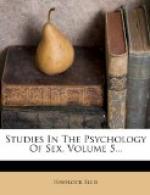The aphrodisiacal effects of wine have long been
known; Ovid refers to them (e.g., Ars Am.,
Bk. III, 765). Clement of Alexandria, who
was something of a man of science as well as a
Christian moralist, points out the influence of
wine in producing lasciviousness and sexual precocity.
(Paedagogus, Bk. II, Chapter II).
Chaucer makes the Wife of Bath say in the Wife
of Bath’s Prologue:—
“And,
after wyn, on Venus moste [needs] I thinke:
For
al so siken as cold engendreth hayl,
A
likerous mouth moste have a likerous tayl,
In
womman vinolent is no defense,
This
knowen lechours by experience.”
Alcohol, as Chaucer pointed out, comes to the aid of the man, who is unscrupulous in his efforts to overcome a woman, and this not merely by virtue of its aphrodisiacal effects, and the apparently special influence which it seems to exert on women, but also because it lulls the mental and emotional characteristics which are the guardians of personality. A correspondent who has questioned on this point a number of prostitutes he has known, writes: “Their accounts of the first fall were nearly always the same. They got to know a ‘gentleman,’ and on one occasion they drank too much; before they quite realized what was happening they were no longer virgins.” “In the mental areas, under the influence of alcohol,” Schmiedeberg remarks (in his Elements of Pharmacology), “the finer degrees of observation, judgment, and reflection are the first to disappear, while the remaining mental functions remain in a normal condition. The soldier acts more boldly because he notices dangers less and reflects over them less; the orator does not allow himself to be influenced by any disturbing side-considerations as to his audience, hence he speaks more freely and spiritedly; self-consciousness is lost to a very great extent, and many are astounded at the ease with which they can express their thoughts, and at the acuteness of their judgment in matters which, when they are perfectly sober, with difficulty reach their minds; and then afterwards they are ashamed at their mistakes.”
The action of opium in small doses is also to some extent aphrodisiacal; it slightly stimulates both the brain and the spinal cord, and has sensory effects on the skin like alcohol; these effects are favored by the state of agreeable dreaminess it produces. In the seventeenth century Venette (La Generation de l’Homme, Part II, Chapter V) strongly recommended small doses of opium, then little known, for this purpose; he had himself, he says, in illness experienced its joys, “a shadow of those of heaven.” In India opium (as well as cannabis indica) has long been a not uncommon aphrodisiac; it is specially used to diminish local sensibility, delaying the orgasm and thus prolonging the sexual act. (W.D. Sutherland, “De Impotentia,” Indian Medical Gazette, January, 1900). Its




